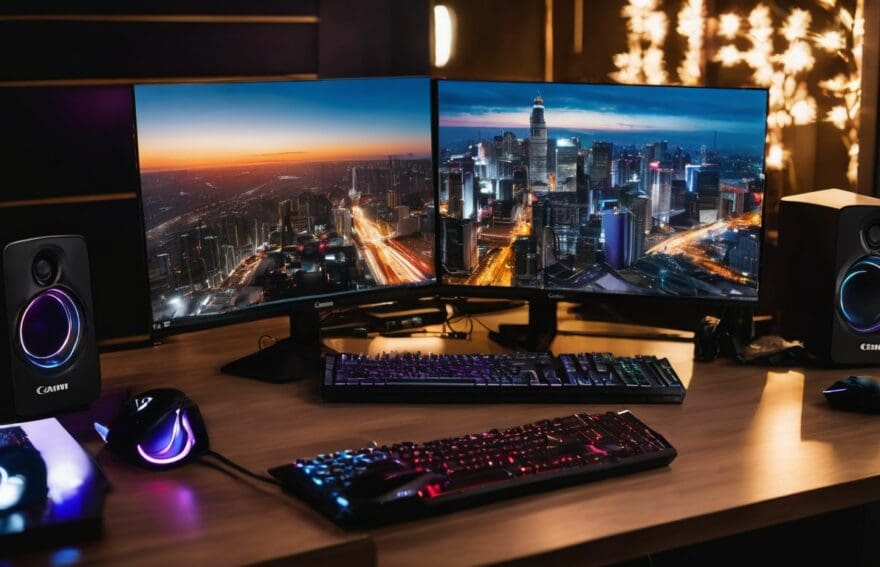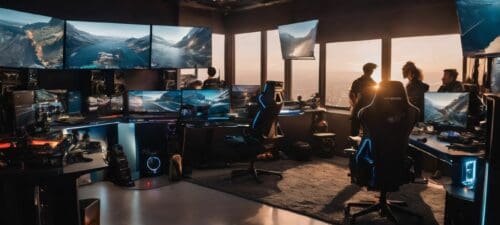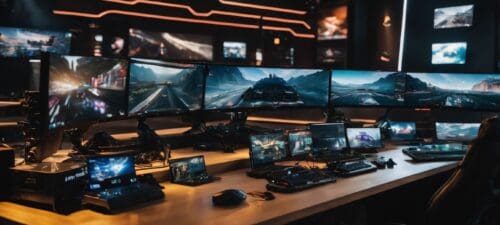Breaking into Esports: Skills and Qualifications You Need

Updated On: October 23, 2025 by James Connolly
Venturing into the dynamic realm of esports can often feel akin to facing an end-level adversary — a mixture of thrill and trepidation, questioning whether we possess the mettle to flip our fervour for gaming into a bona fide career.
We’ve certainly encountered that flutter of anticipation alongside a smidgeon of uncertainty ourselves! Our feature is tailored to unfold the pivotal competencies and credentials required to morph your aspiration into palpable success.
Carry on perusing; triumph could well be lurking just around the next turn!
Skills Required for a Career in Esports
To succeed in the fast-paced world of esports, you need exceptional gaming skills, quick thinking, and strong communication abilities. Extensive knowledge of game mechanics and strategy is also crucial for a successful career in competitive gaming.
Exceptional gaming skills
We know that to break into the world of esports, top-notch gaming abilities are a must. You need more than just fast reflexes and good hand-eye coordination; mastering complex game mechanics and staying ahead with smart strategies is what sets the pros apart from casual players.
Spending countless hours perfecting every move, learning from mistakes, and continuously upgrading your skills can pave the way for a career as a professional gamer.
Our journey in competitive gaming teaches us how essential it is to keep evolving our gameplay. Staying up-to-date with game updates, adapting to new tactics, and being able to outthink opponents under pressure all contribute to exceptional performance during esports tournaments.
To stand out in esports job opportunities or become an influential content creator within this thrilling industry, you’ve got to bring your A-game every single time you compete or showcase your skills online.
Quick thinking
Quick thinking is a critical skill in the fast-paced world of esports. This ability to swiftly assess situations and make rapid decisions can be the difference between victory and defeat in competitive gaming.
With split-second reactions, players must adapt to ever-changing game dynamics, anticipate opponents’ moves, and execute strategies on the fly. In such an environment, honing quick thinking skills is essential for staying ahead of the competition, seizing opportunities, and responding effectively to unforeseen challenges.
As we explore the qualifications and skills needed for careers in esports, let’s delve into how communication skills play a crucial role in standing out as a professional gamer or industry professional.
Communication skills
To complement quick thinking, honing strong communication skills is vital for success in esports. Effectively conveying thoughts and strategies can make a significant impact on team performance.
Whether it’s giving or receiving instructions during gameplay, developing winning strategies, or providing support to teammates, effective communication is key. Enabling seamless collaboration and coordination among team members ensures that everyone is on the same page when executing game plans.
In addition to verbal communication, written communication also plays a crucial role in esports. From crafting detailed gaming strategies to communicating with sponsors and event organisers, the ability to express ideas clearly through various channels is essential for navigating the multifaceted landscape of professional gaming.
Extensive knowledge of game mechanics and strategy
To excel in esports, it’s essential to have a deep understanding of game mechanics and strategic gameplay. This means knowing the ins and outs of the games you plan to compete in, including character abilities, map layouts, and win conditions.
A comprehensive grasp of strategy involves analysing opponent tactics, predicting their moves, and devising counter-strategies on-the-fly during intense matches. Leveraging this knowledge can give you a significant edge over your competitors, allowing for more effective decision-making and adaptive gameplay.
Gaining extensive knowledge of game mechanics and strategy isn’t just about memorising facts; it’s about applying that knowledge quickly and effectively in high-pressure situations.
Qualifications for Esports Jobs
Experience in competitive gaming and education in related fields such as computer science, marketing, or business are essential qualifications for a successful career in esports. Want to learn more about breaking into the world of esports? Keep reading to find out how you can get started!
Experience in competitive gaming
To excel in the world of competitive gaming, honing exceptional skills is critical. Professional gamers must possess lightning-fast reflexes and a deep understanding of game mechanics and strategy.
They need to be able to communicate effectively with teammates, receive constructive feedback, and develop winning strategies together.
Furthermore, experience in competitive gaming is fundamental for anyone aspiring to carve out a career in esports. Attending tournaments provides invaluable opportunities for skill development and networking within the industry.
Through dedication and continuous improvement, individuals can position themselves for success as professional gamers or pursue alternative roles within the vibrant esports ecosystem.
Education in related fields (e.g. computer science, marketing, business)
Individuals with a background in computer science, marketing, or business can bring valuable knowledge and expertise to the esports industry. As the gaming industry continues to grow, there is an increasing need for professionals with skills in technology, digital marketing, and business management.
A solid education in these fields can open doors to various opportunities within esports, such as roles in game development, marketing strategies for gaming products, and event management.
Understanding the core principles of these related fields can provide a competitive edge when seeking employment or pursuing entrepreneurial ventures within the dynamic world of esports.
Esports Career Paths
There are various career paths in esports, from being a professional player to working as a team manager or content creator. To learn more about the skills and qualifications you need for an esports career, keep reading!
Professional player
To succeed as a professional player in esports, honing exceptional gaming skills is crucial. Being highly proficient in your chosen game and continuously refining your abilities will give you an edge in competitive play.
Moreover, quick thinking is paramount during intense matches, allowing you to make split-second decisions that can turn the tide of a game in your favor. Additionally, effective communication with teammates and coaches is essential for devising winning strategies and coordinating your team’s movements on the virtual battlefield.
Participating actively in tournaments and events provides invaluable experience for aspiring professional players while offering opportunities to network within the industry. Continuously sharpening gaming skills and maintaining peak performance levels are vital steps towards success as a professional player.
Embracing challenges and seeking feedback from mentors or experienced players can also contribute significantly to personal growth within the esports realm.
Team manager
Transitioning from a career as a professional player, some individuals may find their passion for esports leading them to pursue the role of team manager. As a team manager in the esports industry, one must possess exceptional leadership and organisational skills.
This role involves coordinating practice schedules, managing team dynamics, and strategising for upcoming competitions. Additionally, effective communication is crucial as the team manager acts as the liaison between players, coaches, and other staff members.
A deep understanding of game mechanics and strategy is also vital for a team manager to make informed decisions about tactics and roster selections. Furthermore, having experience in competitive gaming can provide valuable insight into what it takes to succeed at the highest levels of play.
Content creator
As a content creator in the esports industry, we focus on producing engaging and entertaining content centered around gaming and esports. We utilise our creativity to develop compelling videos, live streams, social media posts, and written articles that resonate with the gaming community.
Our role involves staying up to date with current trends and games within the esports world to create relevant and captivating content that appeals to our audience.
We also collaborate closely with professional players, teams, and event organisers to showcase their skills and highlight noteworthy moments from tournaments. By leveraging platforms such as Twitch, YouTube, and Instagram, we engage with fans by offering insights into game strategies, behind-the-scenes footage at events, interviews with players or industry experts, as well as tutorials for aspiring gamers.
Event organiser
As an event organiser in the esports industry, our role involves planning and executing exciting gaming tournaments and events. We need to have strong organisational skills to coordinate venue bookings, team registrations, and match schedules.
Additionally, we should be adept at managing logistics such as equipment setups, streaming services, and on-site operations to ensure a smooth and professional event experience for players and spectators alike.
Taking inspiration from successful esports events around the world, we strive to create engaging experiences that attract both participants and audiences. Leveraging our communication skills is vital as we collaborate with sponsors, vendors, and media partners to secure resources for the event while promoting it through various channels.
Analyst/commentator
After gaining experience in event organisation, aspiring individuals can explore the dynamic role of an analyst or commentator within the esports industry. These positions require strong communication skills and in-depth knowledge of game mechanics and strategy.
Analysts provide insightful commentary on gameplay, strategies, and player performance during live events, while commentators engage audiences with vibrant play-by-play descriptions.
They must have exceptional gaming expertise to articulate intricate details in a relatable manner that captures the attention of viewers.
How to Get Started in Esports
Dedicate time to gaming, attend events and network with industry professionals, and reach out to esports companies for opportunities. Ready to take the first step towards a career in esports? Read on to discover what it takes to break into this exciting industry!
Dedicate time to gaming
To excel in the world of esports, it is essential to allocate a significant amount of time to gaming. By spending hours honing your gaming skills, you can reach the level necessary for competitive play.
Regular practice and playing with others can help improve your reflexes and decision-making abilities, allowing you to stay ahead in fast-paced games like first-person shooters or battle royales.
Through consistent dedication to gaming, passionate gamers can develop the expertise needed to compete at a professional level and make strides toward a career in the exciting realm of esports.
Attend events and network
Attending esports tournaments and networking within the industry is crucial for aspiring professionals. By immersing oneself in these events, gamers can observe top-tier play, learn from experienced players, and gain insights into various career paths within the industry.
Networking at these events can also lead to valuable connections with potential mentors, teammates, or even future employers.
Aspiring esports professionals should make an effort to attend local and international esports events to build relationships with individuals already established in the industry. These opportunities provide a platform for sharing ideas and gaining exposure to different aspects of the rapidly evolving esports landscape.
Reach out to esports companies
Having attended events and networked within the esports community, it’s important to take the next step by reaching out to esports companies. Research various organisations and understand their needs before making contact.
Tailoring your approach and highlighting how your skills and qualifications align with their requirements can make a lasting impression. Keep an eye on job listings, internships, or volunteer opportunities, as these entry points can lead to valuable experience in the industry.
Conclusion
To break into esports, develop exceptional gaming skills and quick thinking. Hone your communication skills to collaborate effectively in a team setting. Gain experience in competitive gaming and pursue education in related fields for qualifications.
Explore various career paths within the industry, such as becoming a professional player or an event organiser. Dedicate time to gaming, attend events, and network to kickstart your journey into the world of esports!
FAQs
1. What skills do I need to break into Esports?
You need strong gaming abilities, strategic thinking, and teamwork skills for a successful career in Esports.
2. Are there specific qualifications required for Esports?
Whilst formal qualifications may vary, having experience in competitive gaming and knowledge of the Esports industry can be valuable.
3. How does Esports recruitment work?
Esports teams or organisations look for talented players through tryouts, tournaments, or online platforms to fill positions on their rosters.
4. Can I turn my love of gaming into an Esports career?
Yes! If you’re dedicated and skilled at video games, you can potentially turn your passion into a profession by pursuing opportunities within the growing field of Esports.








